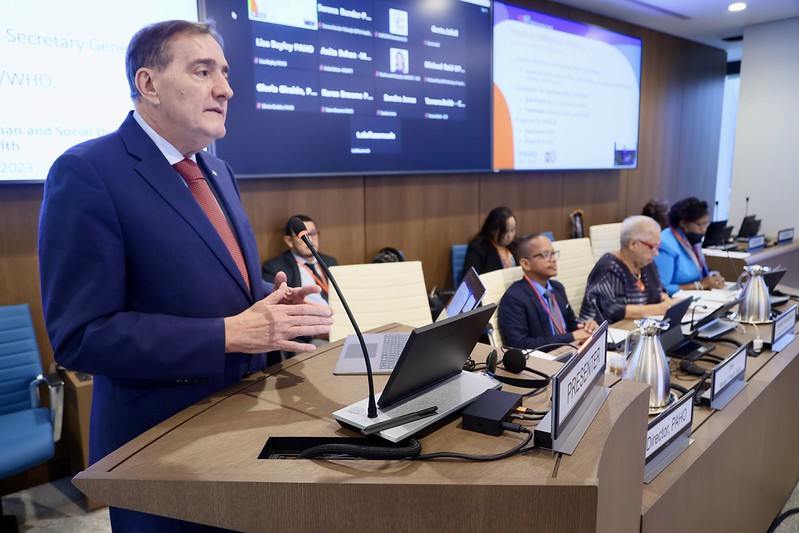Caribbean Ministers Urged to Strengthen Healthcare Systems and Promote Collective Action for Sustainable Health, says PAHO Director

September 28, 2023
Caribbean ministers of health are urged to strengthen healthcare systems, protect the environment, promote healthy living, and prioritize equity in healthcare, with support from the Pan American Health Organisation (PAHO).
Caribbean ministers of health have been urged to utilise collective action to strengthen their healthcare systems, adopt sustainable practices that protect the environment and promote healthy living, as well as prioritise equity in healthcare delivery.
Pan American Health Organisation (PAHO) Director Dr Jarbas Barbosa made this call at the opening of the 45th meeting of the Council for Human and Social Development (Health).
He restated PAHO’s commitment to supporting member states in recapturing the immunisation gains of the past, confronting the emigration of health workers out of the Caribbean, reversing the growing epidemic of non-communicable diseases, and mitigating the health effects of the changing climate.
“The challenges we face are too great for any one nation to bear alone. The pandemic made this glaringly apparent: only through unity and collective action can we overcome the public health trials of our times. CARICOM was founded with this understanding,” Dr Barbosa noted.
While highlighting that during the pandemic the Caribbean and other Small Island Developing States relied solely on imports for these essential health goods, he acknowledged the aspirations of some Caribbean countries to produce their own medicines and medical supplies.
The PAHO director pledged the organisation’s support to facilitate access to affordable medicines, vaccines, and health technologies, in approaching partners and prioritising technical cooperation on the regulatory aspects and demand planning. He noted that PAHO’s revolving funds could also be used to leverage regional production.
While turning his attention to reversing the rates of NCDs despite the “entrenched commercial and financial interests that hinder progress”, he pledged the organisation’s support for measures like front-of-package warning labels, the banning of trans fats and the creation of a smoke-free Caribbean.
“As we continue to advocate for the implementation of the Octagonal Warning labels, we are joined by the University of the West Indies, CARICOM, CARPHA, the Healthy Caribbean Coalition, UNICEF, the Food and Agriculture Organisation, the Organisation of Eastern Caribbean States, and many others, who believe that Caribbean people deserve to have the facts about what they are eating. We will persist, with our partners, to confront the main drivers of non-communicable diseases – tobacco use, unhealthy diets, alcohol use and lack of physical activity,” Dr Barbosa emphasised.
The Caribbean is poised to advance with the elimination of key communicable diseases and conditions. In 2023, eight Caribbean countries and territories, Anguilla, Antigua and Barbuda, Bermuda, Cayman Islands, Cuba, Dominica, Montserrat, and St Kitts and Nevis, were revalidated as achieving the mother-to-child transmission of HIV and syphilis.
Dr Barbosa shared that Belize had now joined this list of countries certified by the World Health Organisation as having eliminated EMTCT earlier this year.
“I am pleased to announce that in partnership with the UN Office for South-South Cooperation, and through the India-UN Partnership Development Fund, PAHO has secured funds to support CARICOM Countries in their efforts to achieve and sustain the elimination of mother-to-child transmission (EMTCT Plus) of HIV, syphilis, and hepatitis B. In the coming weeks we will be conducting consultations to build the path forward together,” he said.
The PAHO director also used the opportunity to congratulate Belize on being certified by the WHO as having eliminated malaria in June. (PR)


